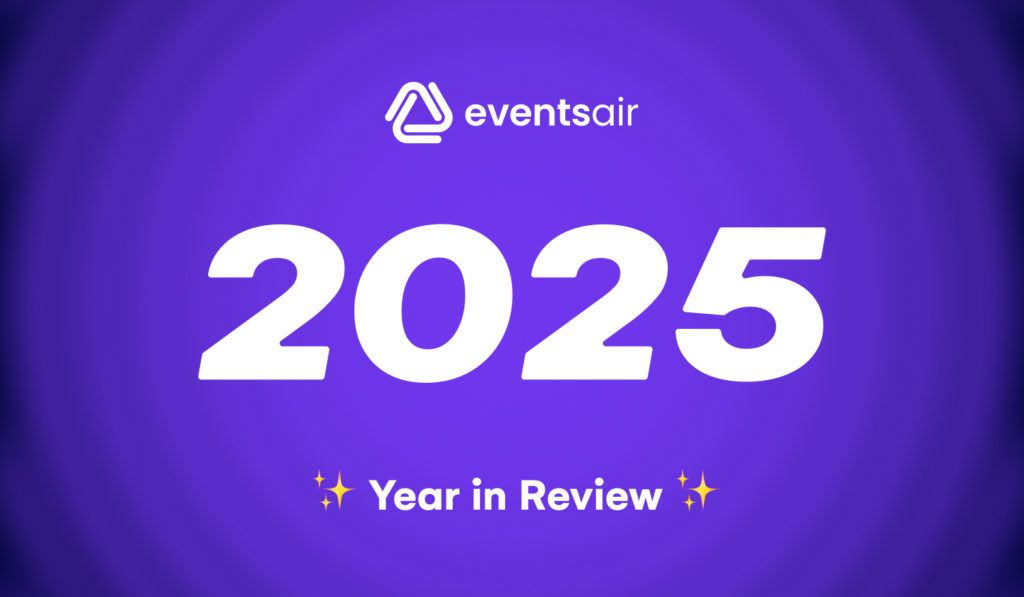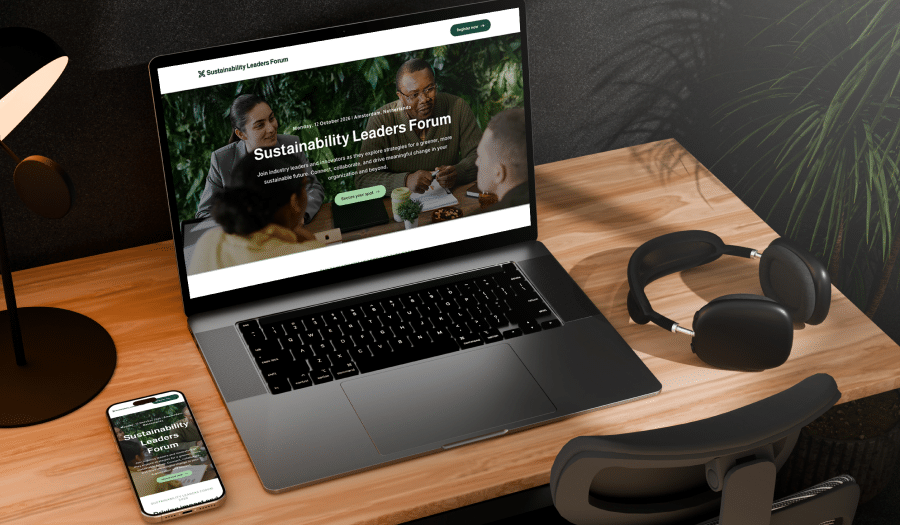
Event apps have quickly become a staple of the event industry.
While apps are now the central touchpoint for attendees to access everything from maps and messaging to schedules and speaker details, when this info can’t be found easily, it can cause frustration and headaches for attendees and event planners alike.
So how do you choose an event app that does everything you need? Keep reading to find out.
What is an event app?
A mobile event app provides a centralized platform for event organizers to communicate with attendees, share information, and facilitate interaction before, during, and after the event. Typically accessible via smartphone or tablet, the purpose of an event app is to act as a one-stop shop for attendees to find info about the event, engage, and connect with others.
What are the benefits of using a mobile app for events?
Using an event app offers several benefits for both event organizers and attendees. Here are some of the key advantages:
- Enhanced attendee experience: An event app provides attendees with a convenient and personalized way to access event information, navigate schedules, and customize their agenda based on their interests. This level of personalization enhances attendee satisfaction and engagement.
- Real-time updates and communication: Event apps allow organizers to send instant notifications and updates to attendees. Whether it’s schedule changes, important announcements, or reminders, attendees can stay informed in real time. This ensures better communication and helps attendees make the most of the event.
- Networking opportunities: Event apps often include features like attendee directories, messaging capabilities, and networking functionalities for attendees to connect with each other, schedule meetings, and engage in discussions, fostering valuable professional connections and collaborations.
- Interactive engagement: Event apps offer interactive features that encourage and boost attendee engagement, such as live polling, Q&A sessions, surveys, and gamification elements. Attendees can actively contribute, share their opinions, and have a more immersive, participatory experience.
- Access to event resources: Event apps serve as a centralized repository for event resources like speaker profiles, session materials, presentations, handouts, and other relevant documents. This eliminates the need for physical handouts and ensures that attendees have easy access to resources before, during, and after the event.
- Data and analytics: Event apps provide organizers with valuable data and analytics about attendee behavior, preferences, and engagement. This information helps in understanding attendee interests, improving future events, and making data-driven decisions for better event planning and marketing strategies.
- Sustainability and cost savings: Event apps reduce the use of printed materials, which contributes to cost savings and a more sustainable, environmentally-friendly event experience.
How do I choose an event app?
When choosing an event app, it’s important to consider several factors to ensure it aligns with your event objectives and meets your attendees’ needs. Here are some key considerations to keep in mind.
Features and functionality: The more features the better, right? Not exactly. Consider your specific event requirements and determine which features are essential to achieve your goals, which are nice-to-haves, and which are not necessary. For example:
- Session schedules
- Speaker profiles
- Venue maps
- Networking and directories
- Discussion forums
- Interactive elements e.g. Q&A live polling, surveys, gamification
- Document sharing
- Social walls
- Surveys and feedback
- Real-time notifications and updates (useful for reminders, schedule changes, etc).
User-friendliness: The event app should be intuitive and user-friendly for both attendees and event organizers. You don’t want to be encumbered by a complex, slow process if there are last-minute changes or updates to make. The interface should be easy to navigate, with clear instructions and a seamless user experience. Consider whether the app supports multiple platforms (iOS, Android, web) to accommodate a wider range of devices.
Customization and branding: Look for an event app that lets you incorporate your event’s branding elements, such as logos, colors, and graphics. Customization options allow you to present a consistent visual identity and tailor the app’s appearance and features to match your event’s unique requirements (e.g. a conference vs a sporting event).
Data security and privacy: Assess the app’s security measures, such as data encryption, user authentication, and compliance with relevant data protection regulations (e.g. GDPR). Consider how attendee data will be stored, used, and protected by the app provider.
Technical support: In the event something goes wrong, or even in the build phase, consider the level of technical support you need, and if that’s offered by the event app provider. Ensure that they provide reliable customer support, including assistance during the event and timely responses to inquiries or issues. Looking at reviews and testimonials will give you a good idea of the real customer experience.
Pricing and scalability: Different pricing models might be based on the number of attendees, features used, data, or a flat fee, which can make it difficult to compare across apps. Consider whether the pricing aligns with your budget and also the scalability of the app – can it handle large events or accommodate future growth in your event attendance?
Integration with your main event platform: The last thing you want is to be exporting and importing data between your event management platform and your app. Look for apps that are seamlessly integrated with your main platform for ease of use and to reduce the risk of data handling eros.
The two critical, but often-forgotten things to consider when choosing an event apps
1. The “One app only” rule
The number one killer of event app engagement is to expect your delegates to download more than one app.
Live polling, Q&A for sessions, attendee messaging, and social walls are consistently ranked as the most used and appreciated features by attendees, and your app should contain these at a minimum.
But not if it means a separate app or another download. The events industry is filled with noise about shiny new apps, products, and features, which all promise to be the next big thing for your event, so it can be easy to think you need it all to compete.
But just remember, it’s an easy, seamless experience, not the whizbang features that create a good experience for your attendees.
2. Real-time connectivity
Secondly, your app should be connected in real-time to your event management platform or event registration solution, for both online pre-registrations as well as onsite registration. This allows for streamlined data management and a smooth check-in experience as, once registered, an attendee automatically goes into your CRM and is instantly set up to access the event app which can be used to check-in, without needing to create a new login or password.
Maximize event app downloads by having newly registered attendees instantly emailed or texted the app details, including their personalized login credentials. A connected onsite experience and attendee app will also allow you to print their app login details directly onto the back of their attendee pass.
Your custom event app solution
Your attendee app is arguably the most important engagement tool at event time, so give it lots of love. Focus on what you want to achieve and ensure the relevant features are all included in one event app solution, and that this solution speaks to your registration system. Your attendees and team alike will thank you for it.
EventsAir’s all-in-one solution includes two powerful custom mobile apps that are ready to energize and impress your attendees, exhibitors, organizers.
Looking for a mobile event app that can do just that? Get a free demo from EventsAir to see how our integrated event management system and app can power your next event.
Attendee Experience | Event Technology & Apps | Mobile Apps
See EventsAir in action
Discover why 12,000+ event professionals trust EventsAir to deliver effortless events, every time.




